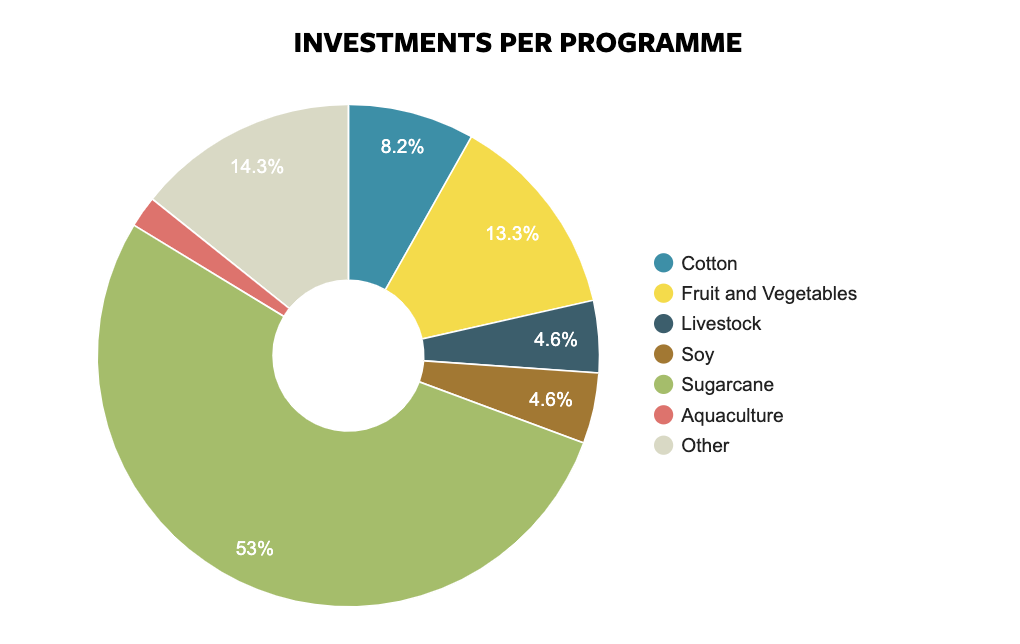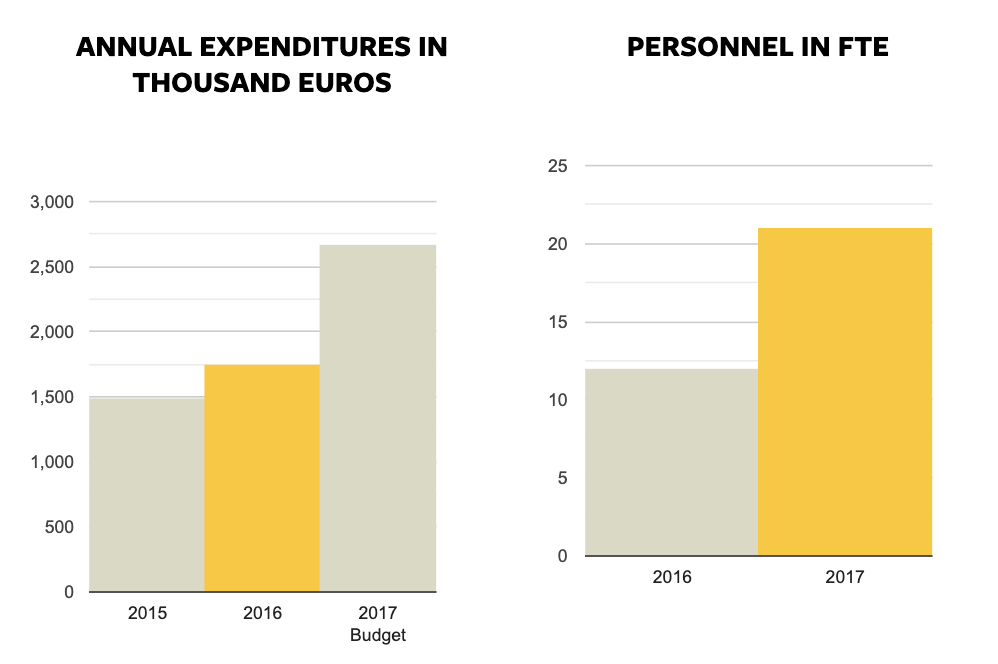The cotton sector is strengthening its connection with countries such as Zambia and Zimbabwe and this is a direct result of increased support from both governments. In 2017, Solidaridad hosted the Network Global Cotton Meeting in Jozini, KwaZulu Natal, South Africa. The three-day meeting was attended by Solidaridad cotton experts and key regional players such as Cotton South Africa, Cotton Association of Zambia and the Sustainable Cotton Cluster Initiative. Insights from both programmes were shared with the global team and new approaches were developed for improving farmer profitability, use of digital tools and innovative financing.

In South Africa, where established sustainability standards apply, Solidaridad facilitated a retailer dialogue in October which brought together important stakeholders to develop a common agenda to make local standards more accessible for smallholder farmers. In Mozambique, where no applicable sustainability standard exists, a similar process is moving toward the first draft of the Mozambique Good Agricultural Practices standard (Boas Praticas Agrícolas). Solidaridad piloted the Farming Solution toolkit as a supportive measure to promote continual improvements in farmers’ competencies.

Solidaridad’s livestock programme has expanded in Zambia. Solidaridad worked with the government and other partners to establish a multi-stakeholder platform. This platform is intended to develop landscape solutions to provide a more coordinated effort to mitigate the effects of climate change in the Kafue Basin. In 2017, Solidaridad took over the management of the Global Livestock Programme and employed a livestock expert to create a Regional Roundtable for Sustainable Beef.

Solidaridad hosted the Global Soy Meeting and the local team learned invaluable lessons from the other regions. The first ever group of farmer associations were awarded certification in line with the Round Table on Responsible Soy. Access to quality seeds remains a key challenge and there is great need to develop a regional soy programme to support farmers to start enterprises as seed multipliers. This will provide quality seed to farmers across the region.

The sugarcane programme in South Africa has increased the capacity of outgrowers. The establishment of a bulk water supply unit has led to more efficient water use and enabled outgrowers to maintain yields despite the region’s drought. In Malawi, Solidaridad’s programme with United Purpose has increased productivity and had significant positive indirect results. A total of 65% of targeted outgrower families no longer experience a hunger gap due to the introduction of crop rotation.

DEVELOPMENTS
The year 2017 was a positive one for the Southern Africa region. This success was driven by a productive agricultural season. Almost all countries had above average rainfall and received sufficient harvests from staples such as maize, sorghum and rice.
Agriculture contributes to at least 17% of the regional gross domestic product and this figure is even higher when South Africa is excluded. Across the region, as the positive results from the agricultural season were only felt in the second half of the year, gross domestic product rose only to about 1.1%.
Slow economic growth has meant that regional governments continue to be under financial pressure to meet social infrastructure requirements and investment in agriculture. Consequently, the large smallholder farmer base continues to face a number of constraints and risks to which they are ill prepared to respond to. The drought of 2015 and 2016 brought this to light as most small-scale farmers demonstrated a severe vulnerability to climate change.
Solidaridad Southern Africa’s work in the region, to deliver innovative solutions across a number of key value chains, remains highly relevant. The opportunity to assist countries to change policies affecting food safety and recognition of good agricultural practices is valid and remains a central focus for the region. Comprehensive sector studies conducted on nine commodities in 2017 provide a strong basis for action to bring all elements of Solidaridad’s result and innovation areas into focus. In addition, the coordination of landscape management must still be integrated to a greater extent.

ACHIEVEMENTS
The Southern African Partnership For Sustainable Cotton and Food Project supported over 24,000 farmers in Zambia and Mozambique and was completed in 2017. This project supported farmers to apply good agricultural practices, gain access to seeds and other inputs, and supported the construction of 10 storage sheds. This allowed farmers to combine their harvests to sell in bulk, as well as store cotton and maize to sell later in the season when purchase prices are higher.
This project also supported farmers to process their cotton into lint. This value-adding process has had a significant positive impact on women who use their lint to spin and weave blankets to sell at a higher price. Access to processing equipment, improved productivity of raw cotton and enhanced skill development has enabled a significant number of women to increase their income. The importance of value-addition is a technique Solidaridad is taking forward in its regional soy programme where women will be trained on processing soybeans into value-added products.
In South Africa, Solidaridad worked with key partners to establish a bulk water supply unit to help outgrowers maintain yields during the region’s worst drought in 90 years. Outgrower associations reported previously having to wait between three and five weeks for contractors to repair faults in irrigation equipment and previously, this resulted in a significant loss of a season’s harvest. However, with the bulk water supply unit, over 1,800 repairs were carried out and completed within two days of the fault being reported.

PARTNERSHIPS
A number of collaborative proposals have been developed under the ambit of the Fruit and Vegetable Stakeholder Platform Consortium. Solidaridad secured 1.2 million euros in a formal partnership with development organization ICCO and rural development foundation LIMA. With this financial resource, Solidaridad aims to leverage additional impact investment opportunities on a higher scale. In its sugarcane programme, Solidaridad participates in the Sustainable Sugarcane Farm Management System. This is a group of key stakeholders which support the industry in adhering to sustainable farming and factory practices.
The partnership with Concern Universal continues to drive the adoption of a Malawian regulatory framework to promote improved management within the sugar sector. Solidaridad works with a number of key partners in the soy sector in Mozambique, Malawi and Zambia. The focus of these partnerships in 2017 related to financial support to improve farmer’s production systems, additional extension support, and research into soya productivity and market access.
Within the cotton sector, Solidaridad supports the creation of the East and Southern Africa Cotton Organization which has brought together farmer organizations and other industry players. Within the livestock sector, a regional multi-stakeholder group under the Roundtable for Sustainable Beef is being established. Through the establishment of the Mazabuka Multi-Stakeholder Platform in Zambia, Solidaridad has been able to partner with private, public and civil society players to drive innovative landscape pilots in a number of commodities. Collaborations are also being explored with Accenture, WorldFish, Graca Machel Trust and IDH.
ORGANIZATION
The year 2017 was characterized by the exciting growth of the Southern Africa Solidaridad team. In an effort to enhance its work in innovation, specialists in climate innovation, gender inclusivity, impact investment and digital technologies were recruited to further strengthen Solidaridad programmes in the region. New staff joined administration teams at the country office and regional level. This has increased capacity within the administration division.
COMMUNICATION & CAMPAIGNING
Communication both internally and externally has become a focus area for improvement in the regional office. To strengthen capacity, a Communications Coordinator will be employed in early 2018 to coordinate the production and dissemination of information on projects, programme learnings and research reports. The Communications Coordinator will be tasked with ensuring that sector and innovation experts are playing a thought-leadership role by contributing their voices in targeted media, and facilitating opportunities to speak at relevant workshops and conferences. The strategy for Solidaridad Southern Africa will be to work towards thought leadership in key commodities and to become a leading voice in promoting innovation within the region.
FINANCE & CONTROL
The annual income for Solidaridad Southern Africa was 2.6 million euro for the calendar year 2017. This was 200,000 euro higher than the budget of 2.4 million euro for 2017. This was due to increased expenditure in the final year of implementation of a 4.5-year cotton and food security project. Annual expenditure has demonstrated a progressive increase over the past three years and is set to continue in 2018.
There were significant deviations in the actual commodity expenditure compared to the budget during the year due to delayed implementation of the Practise for Change programme. Additional expenses were incurred in sector studies and programme development for the Practise for Change programme compared to actual implementation and commodity expenditure, delayed until 2018. This expenditure pattern has resulted in a higher percentage of allocated spending on other categories compared to the specific commodities.
Actual overhead expenditure for 2017 was 995,000 euro, which is about 200,000 euro lower than budget due to the delayed recruitment of staff who were only appointed late in the year. The overall result for the region was a deficit of 118,000 euro predominantly due to delayed implementation of the Practise for Change programme. This is anticipated to be recovered during 2018 as implementation is accelerated in the region with improved capacity, increased number of projects and opportunities.
